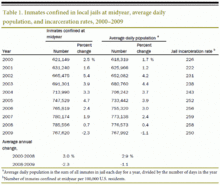Health Effects from Incarceration of Indigenous Australians
The Australian prisoner population currently retains 22% of indigenous prisoners.[1] Western Australia was the first state to experience a dramatic rise in indigenous imprisonment in 1841.[1] Incarceration can lead to multiple negative health effects on the individual.[1] These negative effects have been well researched and include mental health and wellbeing complications, grief and loss, violence and the need for family and community.[1] Juvenile Incarceration has rapidly increased over the last 15 years, which causes complications on youth mental and physical growth.[2]

American Incarceration and Treatment compared to Australia
Incarceration is the state of being confined in prison. Social Justice Commissioner, Mick Gooda reports to ABC that over the past fifteen years in Australia, indigenous incarceration has accelerated by 57% throughout men women and children.[3] The treatment of indigenous people has also significantly changed and positively changed in Australia. In 1850, Nathaniel Hawthorne suggested that prison is necessary but not entirely desirable social institution.[4] The U.S incarceration rate has increased significantly by more than 5 times greater since 1973.[3] Studies have shown that a greater amount of the adult population in America is behind bars and is significantly larger than anywhere else in the world.[4]
Effects of Imprisonment
There have been a large quantity of Indigenous Australians in imprisonment who experience many health defectors including malnutrition, ignorance, diseases, lack of opportunity, annihilating of their individual identity of who they are which is defined by their personality.[5] Statistics have shown that indigenous people are thirteen times more likely to be incarcerated than non-indigenous people.[5] Incarceration can be a traumatic experience for any persons.[5] There are many other factors associated with mental health effects while in custody, These include but are not limited to psychological distress, life stresses, discrimination, domestic violence. A study has shown that 50% males and 85% of indigenous females reported medium or higher levels of psychological distress.[5]
Juvenile Imprisonment
The University of Sydney, in Australia had researched and examined young juvenile men in incarceration and their personal experiences.[2] The boys were disclosed from their family which cause many negative emotions, including sadness, loneliness, and guilt. One of the responses from a boy and his experience said:
“I was stressing out, missing my family. The phone system was down. I hadn’t been able to talk to my family for four days. There were no cigarettes. I’m on antidepressants. . . . I didn’t get my medication. . . . I felt suicidal.” These negative effects that is brought upon a person within incarceration leaves a juvenile with trauma and long term mental effects.[2]
Deaths in Imprisonment
Death rates in imprisonment has risen dramatically in Australia which has become a national embarrassment.[6] National reconciliation between Indigenous and non-Indigenous people was beyond the bounds of possible in a climate infused with suspicion that the running of the criminal justice system was against Indigenous Australians. In October 1987 there was a large amount of Aboriginal deaths in custody.[6] The Federal Government had become reluctant to the way treatment was being informed towards indigenous people and announced a Royal Commission into Aboriginal Deaths in Custody.[6]
See also
- Aboriginal deaths in custody
- Australian Human Rights Commission
- Incarceration
- Mick Gooda
- United States incarceration rate
References
- 1 2 3 4 Krieg, Anthea S. (15 May 2006). "Aboriginal incarceration: health and social impacts". Med. J. Aust. 184 (10): 534–536. PMID 16719762 – via PubMed.
- 1 2 3 Ashkar, Peter (2008). "Young Offenders' Subjective Experiences of Incarceration". Views from the Inside. 52 (5): 584. doi:10.1177/0306624X08314181.
- 1 2 "Number of Indigenous Australians in prison a 'catastrophe'". ABC News. Retrieved 2015-09-04.
- 1 2 Gottschalk, Marie (2006). "THE POLITICS OF MASS INCARCERATION IN AMERICA". The Prison and the Gallows.
- 1 2 3 4 Wooten, Hal (2002). "Choice and Development for Aboriginal and Islander Australia". Indigenous futures.
- 1 2 3 Weatherburn, Donald (2014). "Pathways out of Indigenous imprisonment". Arresting Incarceration.